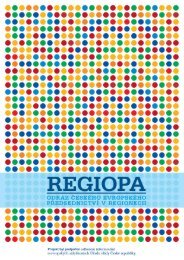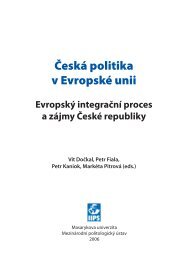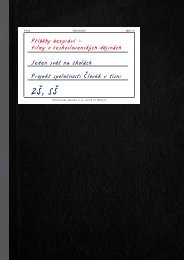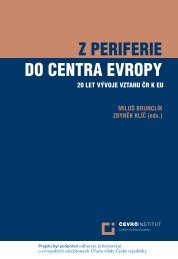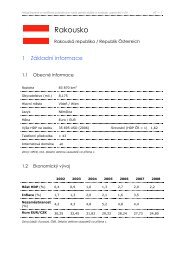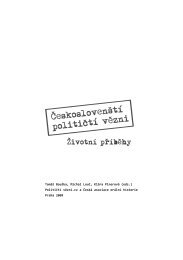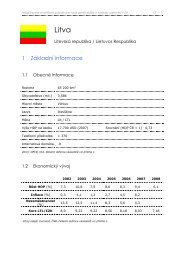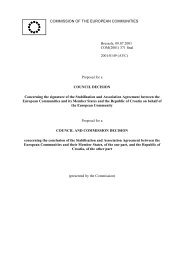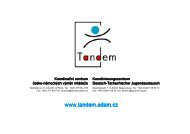CESTA KE SVOBODÄ PÅÃBÄHY BEZPRÃVÃ - Euroskop.cz
CESTA KE SVOBODÄ PÅÃBÄHY BEZPRÃVÃ - Euroskop.cz
CESTA KE SVOBODÄ PÅÃBÄHY BEZPRÃVÃ - Euroskop.cz
- No tags were found...
You also want an ePaper? Increase the reach of your titles
YUMPU automatically turns print PDFs into web optimized ePapers that Google loves.
was ruined after his second term of imprisonment and he died before his time in 1988.Jiří Gruntorád published a series of samizdat publications called Popelnice (“Dustbin”)and he was also a signatory to Charter 77. He spent the years 1980–1984 in jail because ofhis samizdat activities. (The official reason was for “subverting the state”.) In Minkoviceprison in north Bohemia, he demanded his rights so vigorously that the prison guardsalmost killed him. The Jesuit priest František Lízna is another example of the courageousand determined resistance that was shown on various fronts. He signed Charter 77 andwas also involved in the distribution of samizdat literature. On 28 September 1981, he wassentenced to 20 months in prison for this as well as for the “theft of socialist property”and “unauthorised business activities”. In January 1982, he was sent to prison again for“damaging the interests of the state abroad”.The end of the 1980s: petitions and demonstrationsPetitions were a typical expression of opposition and protest connected with the last phaseof communism and independent initiatives. For example, this included a petition in 1987called “Incentives for Catholics to Resolve the Situation Concerning Religious Citizens”,which was organised by Augustin Navrátil. Incredibly, this was signed by 6,000 people,many of whom were certainly not adherents of organised religion. The petition contained31 points, which among other things demanded the separation of the Church from thestate, the restoration of religious freedom, the appointment of bishops, Church accessto mass media, the release of imprisoned priests and lay people, as well as the renewalof monastic life. Signing Navrátil’s petition had no serious consequences for individualsignatories. There were so many of them that persecution was essentially not feasible. Theconsequences for Augustin Navrátil himself, however, were not so good. The communistsecret police tried to remove him to a secure psychiatric facility. He was eventually set freethanks to the efforts of a special committee set up to demand his release, the activities ofdissidents, and a huge international outcry.Author’s note:I consider it important to point out that I am not trying to “dabble” as a historian. I had no desire tooutline all expressions of resistance from the years 1948–1989. (This would have been beyond me in anycase.) Moreover, I cannot deny that some of the cases described herein could prove to be more complicatedupon closer analysis (particularly with regard to the activities of secret police agents in resistancegroups). At the same time, I cannot be held accountable for the tardiness of Czech historiography indealing with this issue. Almost 20 years after the fall of communism in the Czech Republic, no exhaustiveand comprehensive work has yet been done on the active resistance to the Communist Party that existedduring the relevant period. The Institute for the Study of Totalitarian Regimes has effectively only beenoperating since 2008.I am extremely grateful to the historian Tomáš Bursík for his comments and consultations concerningthis text.This is an abridged English version of the original Czech text.Another petition that deserves attention was signed in October 1988. This documentconcerned the crimes of communism and the death of Pavel Wonka (a civil rights activistwho tried to stand for election and who was sent to prison despite his very poor health).He died in jail in 1988 in circumstances that have never been properly explained. IvanMartin Jirous and Jiří Tichý were given jail terms for organising the petition.The roll call of active resistance during the normalisation period (or the era of supposed“real socialism”) could be even longer. For example, we have made no mention of a seriesof anti-communist demonstrations held primarily during the so-called Palach Week(marking the anniversary of Jan Palach’s death) in 1989. Dozens of demonstrations wereorganised. The police brutally suppressed most of them and the demonstrators ended up ininterrogation facilities or were even brought before the courts, where they were punishedfor the crimes of “sedition” and “disorderly conduct”.44 | 45



